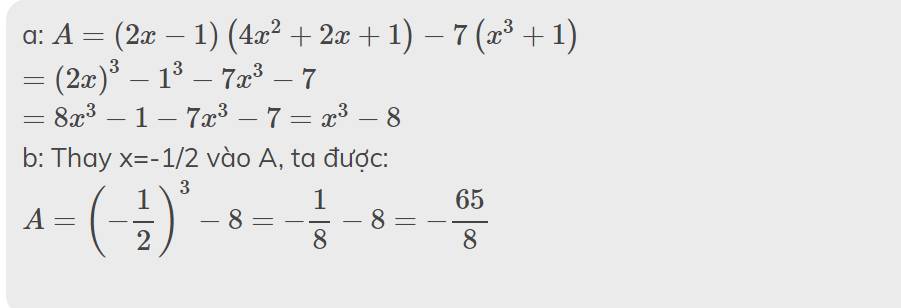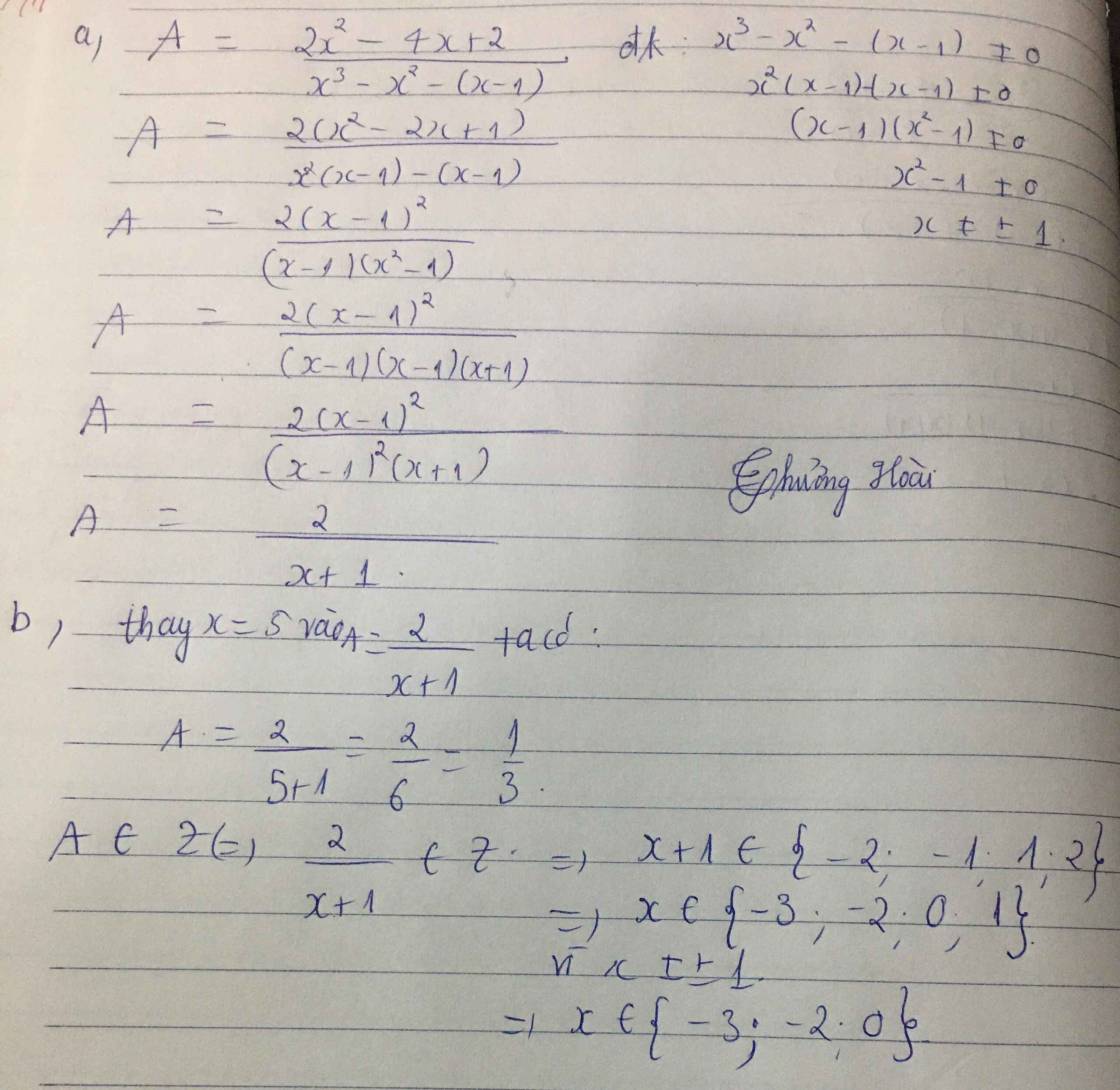Hãy nhập câu hỏi của bạn vào đây, nếu là tài khoản VIP, bạn sẽ được ưu tiên trả lời.

a: \(M=\dfrac{2x^2-10x-x^2+x+30-x-5}{\left(x-5\right)\left(x+5\right)}=\dfrac{x^2-10x+25}{\left(x-5\right)\left(x+5\right)}=\dfrac{x-5}{x+5}\)
b: Để M là số nguyên thì \(x+5\in\left\{1;-1;2;-2;5;-5;10;-10\right\}\)
hay \(x\in\left\{-4;-6;-3;-7;0;-10;-15\right\}\)

a: \(P=\dfrac{x^2+x-x^2+x+2}{\left(x-1\right)\left(x+1\right)}=\dfrac{2}{x-1}\)

a: \(A=\left(2x-1\right)\left(4x^2+2x+1\right)-7\left(x^3+1\right)\)
\(=\left(2x\right)^3-1^3-7x^3-7\)
\(=8x^3-1-7x^3-7=x^3-8\)
b: Thay x=-1/2 vào A, ta được:
\(A=\left(-\dfrac{1}{2}\right)^3-8=-\dfrac{1}{8}-8=-\dfrac{65}{8}\)


c: \(A=x^3-8=\left(x-2\right)\left(x^2+2x+4\right)\)
Để A là số nguyên tố thì x-2=1
=>x=3

a: ĐKXĐ: \(x\notin\left\{-\dfrac{1}{2};\dfrac{1}{2};-2\right\}\)
b: \(B=\dfrac{4x^2+4x+1-4-4x^2+4x-1}{\left(2x-1\right)\left(2x+1\right)}\cdot\dfrac{2x+1}{x+2}\)
\(=\dfrac{8x-4}{2x-1}\cdot\dfrac{1}{x+2}=\dfrac{4}{x+2}\)

a) \(M=\frac{x}{x+1}+\frac{1}{x-1}-\frac{2x}{1-x^2}\left(x\ne\pm1\right)\)
\(\Leftrightarrow M=\frac{x}{x+1}+\frac{1}{x-1}+\frac{2x}{\left(x-1\right)\left(x+1\right)}\)
\(\Leftrightarrow M=\frac{x^2-x}{\left(x-1\right)\left(x+1\right)}+\frac{x+1}{\left(x-1\right)\left(x+1\right)}+\frac{2x}{\left(x-1\right)\left(x+1\right)}\)
\(\Leftrightarrow M=\frac{x^2-x+x+1+2x}{\left(x-1\right)\left(x+1\right)}\)
\(\Leftrightarrow M=\frac{x^2+2x+1}{\left(x-1\right)\left(x+1\right)}=\frac{\left(x+1\right)^2}{\left(x-1\right)\left(x+1\right)}=\frac{x+1}{x-1}\)
Vậy \(M=\frac{x+1}{x-1}\left(x\ne\pm1\right)\)
b) \(M=\frac{x+1}{x-1}\left(x\ne\pm1\right)\)
x-2=1
<=> x=3 (tmđk)
Thay x=3 vào M ta có: \(M=\frac{3+1}{3-1}=\frac{4}{2}=2\)
Vậy M=2 khi x-2=1
c) \(M=\frac{x+1}{x-1}\left(x\ne\pm1\right)\)
M nguyên khi x+1 chia hết cho x-1
=> x-1+2 chia hết cho x-1
x nguyên => x-1 nguyên => x-1 thuộc Ư (2)={-2;-1;1;2}
Ta có bảng
Vậy x={0;2;3}